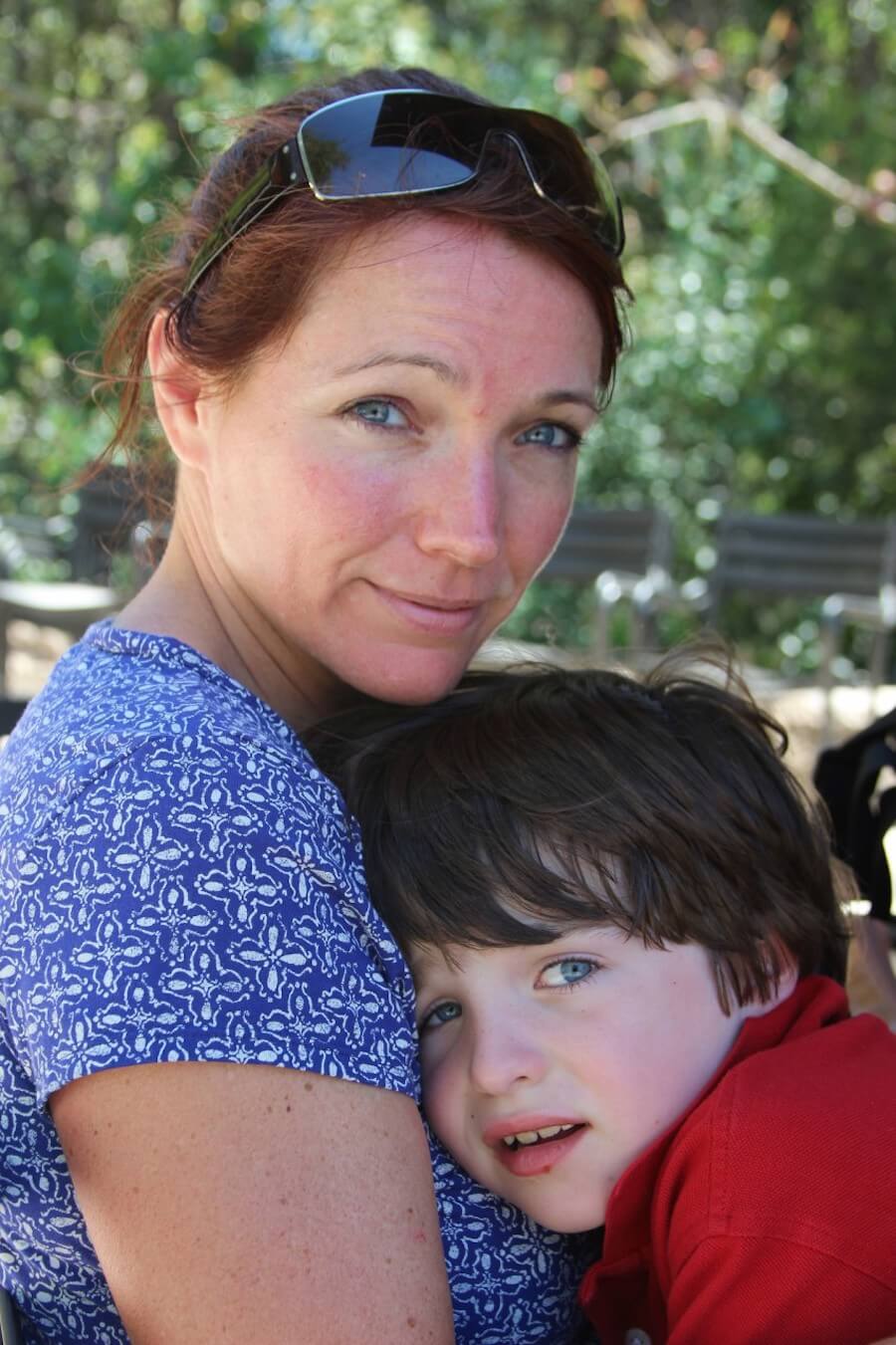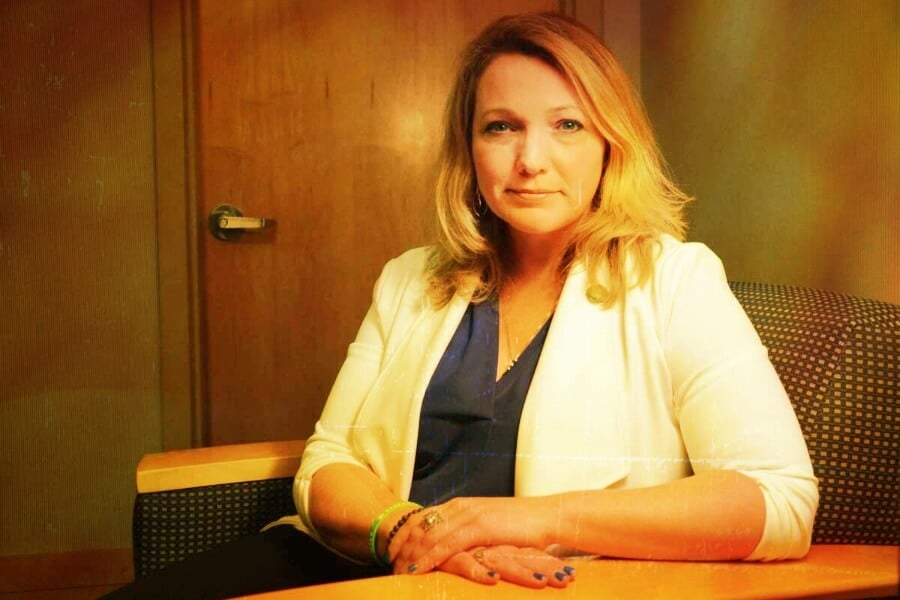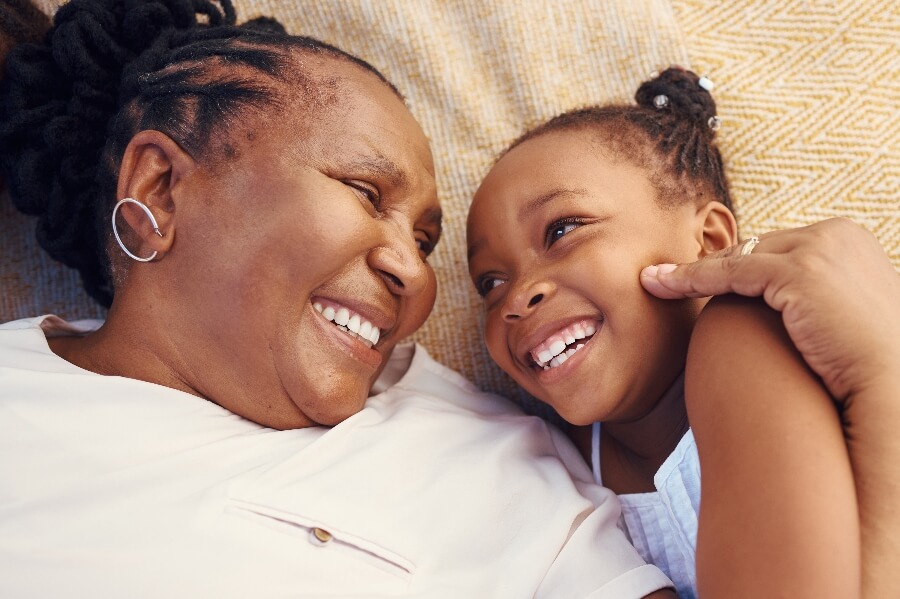Editor’s Note: With the news of yet another massacre of young children, we are re-publishing this September 2019 interview with Nicole Hockley, the mother of a six-year-old gunned down at Sandy Hook who has become a staunch activist for protecting the public from gun violence, especially children like her son and those who died yesterday in Uvalde, TX.
***
A quietly devastating public service announcement is reaching your screens today.
With dark irony laced through the innocent words of a multicultural mix of charming, cheerful students, we see a series of school kids looking at the camera and winsomely displaying their back-to-school accoutrements. “My mom got me the perfect backpack,” a boy says, brightly; a girl shows some cool folders; a boy, the headset that will help him study. Then, using the same ordinary-sounding praise, a boy talks about his sneakers – except he’s running… from a shooter who has just burst through the school door. “This skateboard is a must-have,” says another boy… using it to break through a glass window to escape death. “These new socks can be a real lifesaver,” says a girl, and her words are literal: She’s using the socks to tend to a fellow student’s very bloody wounds. Several more examples ensue.
“It’s back-to-school time, and you know what that means,” runs the text at the end.
Generation Lockdown
This is the new normal. This is what back-to-school time means today. Students—some who haven’t even reached middle school—anticipating not just classes and crushes, but the possible burst through the door of a shooter armed with a boosted military-style rifle able to shoot dozens of them dead in minutes.
You don’t want to be me. And you have the capacity to make the difference.
“It’s Generation Lockdown,” says 48-year-old Nicole Hockley, the co-founder and managing director of Sandy Hook Promise, the organization responsible for the PSA. It tells a tragic truth: one that Hockley knows all too well. To tell her story—which she originally shared with me in a phone conversation two-and-a-half years ago and has recently updated me on—let’s go back to an eloquent plea she made to President Trump shortly after the shooting death of 17 students and educators at the Marjory Stoneman Douglas School in Parkland, Florida, on February 14—Valentine’s Day!—2018.
“I implore you: You don’t want to be me,” Hockley had said that day. “And you have the capacity to make the difference.” She was appealing for gun-safety measures that emphasized prevention, and her voice had a dignified equanimity; her journey—the unthinkable tragedy that marked her life—spoke its own volumes.
The Parkland massacre took place almost six years after December 14, 2012. “Twelve/fourteen,” Hockley calls the day that a severely troubled, once-bullied loner had (after executing his mother in her bed) shot his way through a glass panel next to a locked front entrance of Sandy Hook Elementary School, where he had been a student, in the all-American hamlet of Newtown, Connecticut. There, with a military style rifle, he’d murdered 20 six- and seven-year-olds and six educators in eight minutes. Hockley’s younger son Dylan, among them. Dylan – a precious six-year-old boy who, as part of his autism, sometimes jumped up and down and flapped his hands and thus merrily considered himself a butterfly: “a beautiful butterfly,” mother and son agreed—was struck by five bullets, almost one for every year of his life. The special education teacher who attempted to shield him was murdered, too.
When the social worker arrived at the Hockleys’ door at 1:30 a.m. to report the fact that Dylan was one of the dead. Hockley—“a glass-half-full woman,” as she called herself—refused to believe it. “Dylan just can’t be one of them!” she told herself. Then the unbearable truth settled in.
Read More: What Arming Teachers Really Means
Starting a Movement
In the interim between Dylan’s murder and the Parkland shootings, Hockley had, astonishingly, been able to balance a permanently broken heart with a proactive mission. She had been a marketing director before taking a break to be a full-time mother, so a plan emerged even at Dylan’s funeral a week after his murder. Hockley stood in front of her son’s tiny casket and “spoke about the change that was needed, even though I didn’t know what the change was yet,” she told me when we had our first conversation. With Mark Barden, another parent of a murdered Sandy Hook child, and the parent, Tim Makris, of a surviving child, Hockley founded Sandy Hook Promise.
As a former marketing director, she had a plan even at Dylan’s funeral a week after his murder.
SHP’s members go into schools all around the country—they are in all 50 states now—and partner with students, teachers, experts, and parents in now provenly successful efforts to see the signs of anger and alienation in troubled students and treat them before they can grow into violence.
Then, as now, Hockley spent about 60 percent of her time traveling to spread SHP’s program. Sometimes, she had poignantly told me during that first conversation, being away from home could temporarily give her the soothing fantasy that she was soon “coming home to Dylan; I could believe that he was still here.” Such was her self-protective hope and poise.
Then Came Parkland

Nicole Hockley and her son, Dylan.
“But Parkland threw me,” she said the other day. “I was in L.A. at a seminar at the time, and I started seeing the tweets around lunchtime, and I got on a plane to go there the next morning. This was the most significant school shooting” since Sandy Hook, and though I thought I was emotionally prepared for it, everything was triggered in me. All the media vans circling around. The crisis center. They brought back memories I didn’t even know I had anymore. The community was reeling. I was able to make connections between the mayor of Parkland and the town officials of Newtown, and I met with some of the students and families, and we shared our flood of emotions. I helped them see that their feelings were so normal.”
In these horrible situations, “I see a mirror of what I was on twelve/fourteen and right afterward. I want to hold these parents tight and wish away what happened. I ask them to give themselves a lot of grace. But it’s so hard.” She sees their futures for them: “You are a parent to a memory now.”
Parkland was traumatizing for her. After several days there, “on the flight home, I just crashed and became really sick for a few days afterward.”
Then she pulled it together, of course, to sit in a room with other anti-gun- and school-violence activists and tell a basically unresponsive Donald Trump at an in-person listening session at the White House, “I implore you: You don’t want to be me.”
No parent does.
And yet so many parents are now.
A Dangerous Renegade
This has been the season of heinous, random shootings. The very recent mass killings in Texas and Ohio left 37 dead and dozens injured, including a 17-month-old El Paso girl who was shot in the mouth and the chest. They have made America a dangerous renegade in the civilized world—a place we wouldn’t have imagined even 10 years ago. But in addition to those awful, senseless incidents in which people of all ages were targeted in sites as safe and wholesome as the back-to-school-shopping aisles of Walmart, shootings in schools—targeting children—have become commonplace.
We’re not involved in gun control. We’re about violence prevention.
There have been 22 school shootings in 2019 so far, and 94—including Parkland—in 2018, making that year the deadliest on record for school shootings. In a recent public service announcement, Hockley had asked for the public to come up with the rest of the 50,000 signatures needed to demand that Congress limit the size of gun magazines. But the new public service announcement, debuting today, makes the most relevant case: Nearly seven years after what seemed like the nightmare exception of Sandy Hook, this—a place a shooter could be expected to enter—is what school has become.
It has been the job of Sandy Hook Promise to change that. And, to a remarkable degree in the six years the organization has been in existence, it has almost certainly prevented more school shootings. “At our last audit, the organization had trained 7.5 million youth and adults, averted multiple school shootings and suicide threats, and our anonymous reporting system has logged 30,000 tips that have stopped everything from bullying to cutting to eating disorders to sexual abuse to suicide,” Hockley told me. By teaching school students to “Start with Hello” (to integrate loners into peer groups) and “Say Something” (report a troubled student to a trusted authority), they’re teaching kids to look out for each other. Kids know what is going on with their peers in a way that adults don’t, she says.
“We’re not involved in gun control,” Hockley stresses. “We’re about violence prevention. We do support gun-safety legislation,” of course, “but we focus on both the gun and the person behind the gun. How do you spot the risks? We try to get there before the guns come into the picture.”
She pauses and then says, “It’s so meaningful to me. I couldn’t save Dylan, but I know through his death we’re doing something to keep so many mothers and so many other students from the experience” she went through. “Yet there are so many more lives to save.”
Read More: What You Said About Gun Control and What Steps to Take Next
A Shattered Heart
When I first spoke to Hockley—on the occasion of the release of the documentary, Newtown, she told me however much good work Sandy Hook Promise does, she struggled with her grief. “Every day, waking up, it’s like taking my heart out and putting it back in tatters and waking up the next morning and doing it all over again.”
The sadness never changes, but there are waves of grief.
In our recent talk, I asked her what had changed now, almost three years later. “The sadness never changes,” she said, “but there are waves of grief. They just have more spaces between them. The pain is still there—it’s never going to go away.” And her daily rituals of closeness with Dylan remain too. “When I’m home, the first thing I do every morning is kiss his urn, and the last thing that I do before I go to bed is tell him I’m his mother and I miss him. There are points that hurt me very badly—his birthday, March 8, is the worst day of the year.”
And there’s something poignantly anxious in the passing of time. Her older son, Jake, who turned 15 on the Fourth of July, “changes every day, but Dylan will always be 6.” She’s afraid she won’t be able to hold onto the realness of Dylan. The date this article is being published “is the first day he will be gone more days in my life than he was ever with me. I fear that I’ll forget what his hair smells like and how he laughs.” When she and Jake moved to a new house in Newtown, she was careful to put “Dylan’s hat and his handprints” around the house so Dylan will be present there, like he was in the house he lived in. “But I also balance them very carefully with items from Jake,” she adds, “so Jake knows he is a massively important person in my life.”
Hockley and her ex-husband, Ian, have been divorced for three years – after 20 years of marriage. “Twelve/fourteen tore us apart. But we are still very good friends, and we see each other daily.” Ian left his corporate job to run Dylan’s Wings of Change, a foundation in Dylan’s memory that supports children with autism and shares office space with SHP. “And we co-parent Jake extremely well because there’s already been enough trauma.” When Hockley is away, Jake lives with his father.
The Older Brother
Hockley is delicately mindful of Jake’s need to be acknowledged independently, apart from the work his mother does that is so focused on what happened to his brother. “I tread very, very carefully because he has his own voice and his own story,” she says. After the Newtown documentary was made, the filmmakers wanted to come to the house, and I asked Jake if it would be all right, and he said, `Would you be upset if I said no?’ I said, ‘Of course not.’ He said, `Next time we’re on TV, I want it to be something I’ve done—not because my brother was killed.’ How profound that was! And he was only 11 at the time. So I invite him to events, but I always respect his right to choose whether or not to get publicly involved.”
I certainly want change in my lifetime. I want to create a safe environment for [my other son] to grow up.
Despite the recent rash of shootings, movement on serious gun control still seems to be lagging behind where it desperately needs to be. Republicans talk of prayer and sometimes mental illness (with which Nicole agrees). Red flag laws—which would only temporarily take heavy-duty guns away from actively unstable gun owners (and return them to their owners once they became “stabilized,” whatever that means)—are the best the party seems willing to offer.
But things have changed in increments. After the El Paso incident, Walmart is limiting open carry and the sale of ammunition. Nearly 150 CEOs of American companies have sent a letter to Congress demanding action on gun safety. Alex Jones, the heinous fulminator who harassed the freshly grieving Sandy Hook parents with scathing accusations their children never existed, lost another chance to stanch a lawsuit from the parents. So far, the SHP-sponsored bill to hold gun manufacturers responsible for multiple deaths with military-style weapons that should not be sold to civilians is making its way through the Connecticut court system successfully. And, most promisingly, the Parkland students’ organization March for Our Lives has unveiled a comprehensive gun safety plan that goes far beyond background checks. “A Peace Plan for a Safer America,” it is called.
Hockley is carefully pragmatic. “Sustainable change? Hard to tell. I think it will be a couple of years before we see background checks, but I certainly want change in my lifetime. I want to create a safe environment for when Jake grows up.
“When I am having a difficult day, I talk to Dylan. I always say, I love you and I miss you and I ask him for help through a difficult time. I want him to be proud of what I’m doing.”
Dylan is her beautiful butterfly, present tense. “I will see a butterfly—or one will land on my hand. And I will say, `That’s Dylan.’”
“I implore you: You don’t want to be me,” Hockley had said. But despite that undeniable fact, she has created grace and a meaningful life from her tragedy.
A version of this story was originally published in September 2019.





















0 Comments